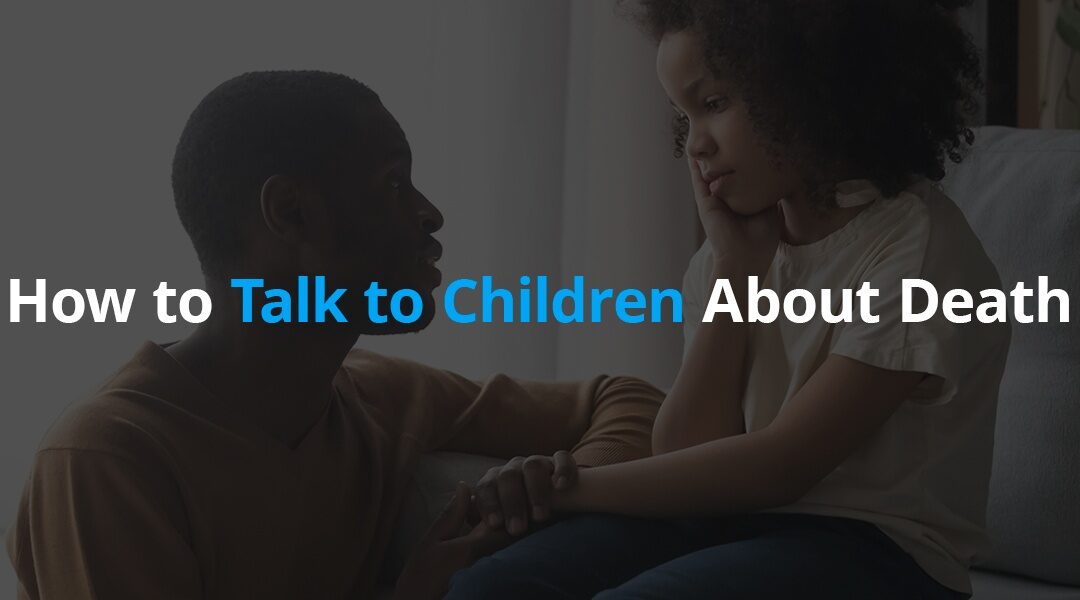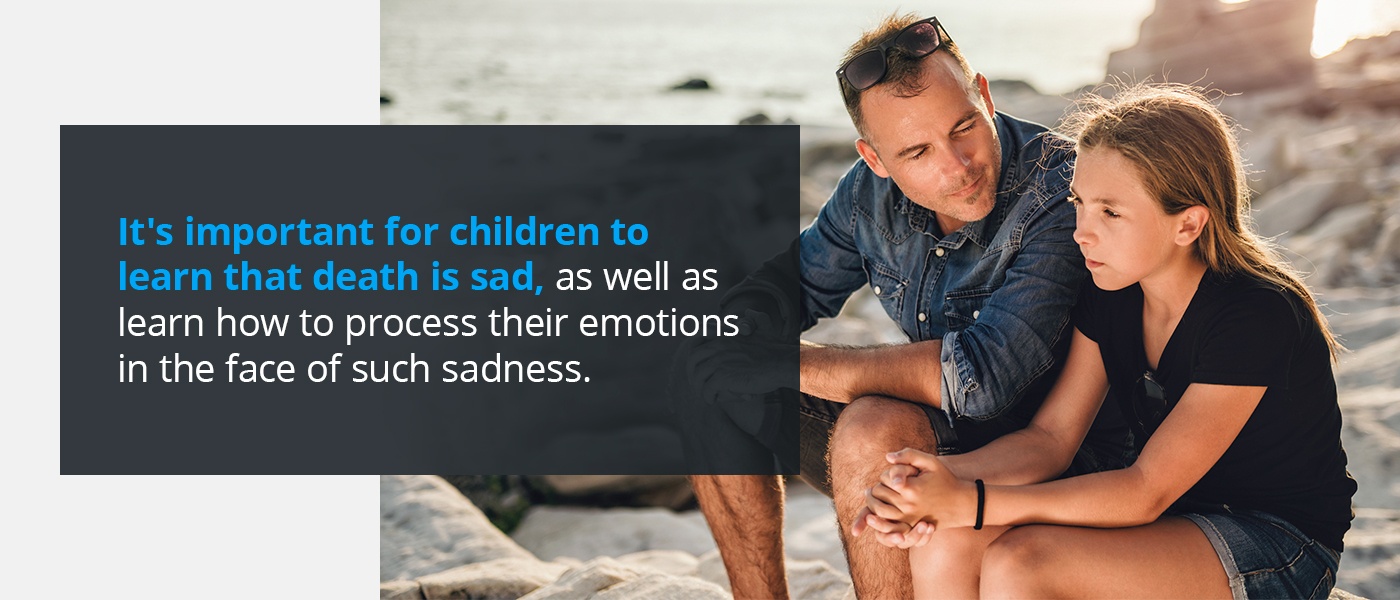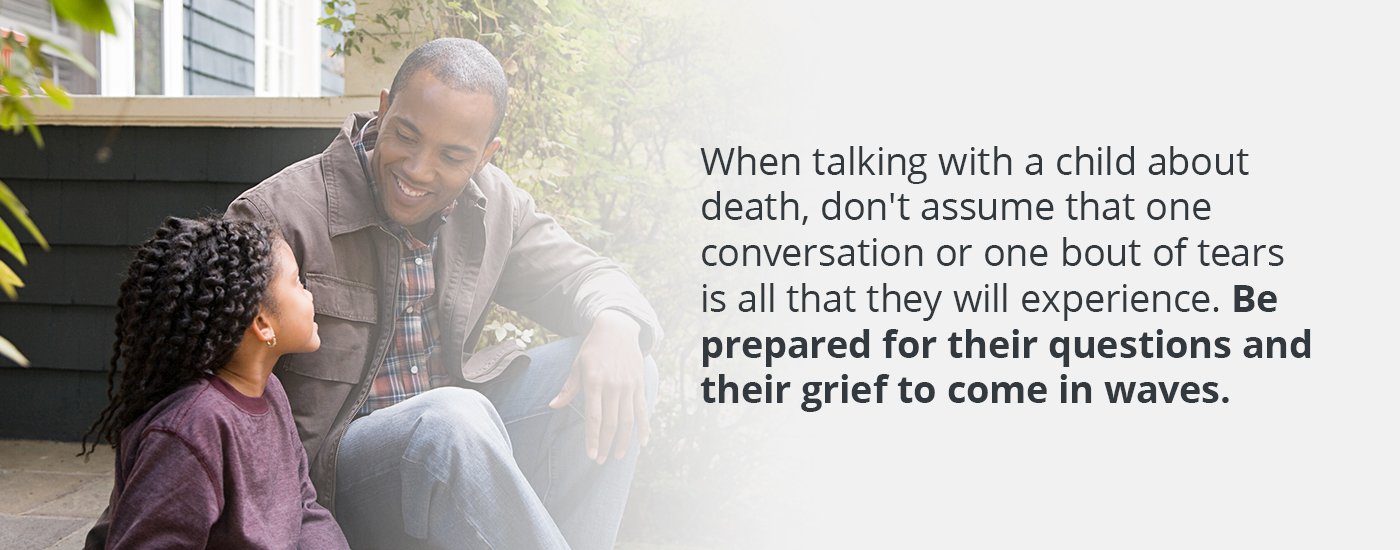No one wants to talk about death, but if you’re a parent, the prospect of talking to your child about death can be especially daunting. There’s no “right time” if you’re wondering when to talk to children about death. Many times, conversations about death happen because someone your child loves has died or is expected to die soon. This can make the task of discussing it even more difficult because there are a lot of emotions and uncertainty swirling through your family. Although it may be tempting to avoid or gloss over the topic, the best way to help a child understand death is to talk about it. Helping kids understand death starts with a conversation. But knowing what to say and how much to say can be difficult for parents. When do kids understand death? There isn’t a specific age that kids begin to understand death, but young children typically aren’t developmentally advanced enough to understand as much as an older elementary school-aged child can, for example. Regardless of how old a child is, though, there are some important things parents can do to help children understand death.
Tips for Talking to Kids About Death
Children show their grief in different ways, just as adults do. But parents can follow a few simple tips to guide the conversation and help a child understand death.
1. Be Honest
Young children haven’t taken a biology class, so the best thing to do is explain — in simple terms — what happens to the human body when it dies. Avoid using colloquial phrases, such as “she went on a long journey” or ” he’s on the other side.” To a child, these phrases imply that their loved one has simply chosen to take a trip, and it gives them a false hope that they may return later. Even talking about the death of a pet can be difficult if you don’t use the right terminology. For example, when you say “we put the dog to sleep,” a child hears that and may incorrectly believe that sleep and death are related. Rather than providing an explanation for why their beloved pet is gone, this can potentially instill fear in a child that sleep may also result in death for them. Although it may be difficult, the person closest to the child should be the one to tell them when a loved one passes away. In most cases, this would be a parent. This can be a challenge if the parent is also grieving, but children need to be with the adult they trust the most when they first encounter the loss of a loved one. If a parent cannot be present or is too overcome by their own emotions to talk with their child, then another adult who is close to the child — such as a grandparent, aunt or uncle — should take on the task.
2. Don’t Hide Your Own Emotions
Many parents tend to try to avoid displaying negative emotions around their children. They may assume that their child will be scared or upset if their parent is not positive and upbeat. But when it comes to talking with your child about death, especially if the conversation is prompted by the death of a loved one, it’s important to let your child see how you’re really feeling. Death is sad. It’s important for children to learn that death is sad, as well as learn how to process their emotions in the face of such sadness. It’s also important for children to know that grief is a process. It’s okay if they see their parent cry every day for a while. This doesn’t mean parents should scream and rage in front of their child — some emotions should be reserved for times when children aren’t around — but being honest with the emotions you’re feeling gives children an important lesson in processing their own grief.
3. Don’t Go at It Alone
It takes a village to raise a child, especially when tragedy strikes. If a beloved family member or friend passes away, children may naturally become frightened. After all, if one person disappears and won’t come back, how many other people may that happen to as well? This child’s logic can create a sense of fear and anxiety among children of all ages. To combat this, it’s important to remind them that they are loved by many people. Encourage them to interact with other people who are important to them. If they can’t be together in person, arrange phone calls or video chats so that they can see and talk with those they love. Books and videos can also be helpful for helping a child understand death and how to navigate grief. There are a number of books to help kids understand death, written specifically to assist parents in hard conversations.
4. Don’t Force Them to Go to a Funeral
Funerals are a place to celebrate a life well lived and say goodbye to a loved one. But young children aren’t typically able to understand everything that’s happening at a funeral and may easily become scared or overwhelmed. If your child is old enough to attend a funeral, the best thing to do is give them a choice about whether or not to go. If they do opt to attend, prepare them for what they’ll see. Prepare them for an open casket — if there will be one — or the absence of a body — if the deceased was cremated. Also, prepare them for how to handle the sadness of other adults or what to do if they become overwhelmed by their own emotions. If your child doesn’t want to go to a funeral, never make them feel guilty for their choice. Everyone handles grief in different ways, and shaming a child for the way they choose to handle their loss can have a devastating impact on their emotional state for many years to come.
5. Give It Time
Grief doesn’t last for a day and then disappear. It stays around and changes the very way you view the world. This is true for both adults and children. When talking with a child about death, don’t assume that one conversation or one bout of tears is all that they will experience. Be prepared for their questions and their grief to come in waves. Once a child encounters death, their understanding of the world changes, and their view of life won’t ever quite be the same again. Even as they move past the initial heartache of losing someone they love, they may spend months or years processing through the concept of loss and what it means to die.
Talk to a Professional Counselor About Grief and Loss
If you’re wondering how to help kids understand death, remember that there’s not a magical age when death becomes less sad or less confusing. Dealing with grief or loss can be difficult for children at any age. And even when parents provide a secure, nurturing environment for them to process their grief, children may still continue to struggle. In many cases, children who have experienced loss benefit from counseling. A trained counselor can offer new strategies for talking to kids about death, as well as teach them how to move forward. In some cases, it may also benefit parents to seek help for their own feelings of grief and loss. Processing through your own emotions better enables parents to be present and support their children throughout the grief process. If you or your child are having a difficult time coping with loss, you don’t have to keep dealing with it alone. Merrimack Valley Psychological Associates offers a team of clinicians with experience counseling children, adolescents and adults in times of grief and loss. Schedule an appointment today.
Reviewed By
Dr. David Rainen, PsyD.
I am a licensed clinical psychologist with an extensive background treating a variety of different ages, situations, emotional and mental health disorders in individuals and their families. As part of my 10 year professional and training career in psychology, I have developed and refined my skills and approaches through my work in a variety of diverse settings including: hospitals, community outpatient facilities, college counseling centers, secure and unsecure inpatient/residential treatment programs, and therapeutic day schools.




